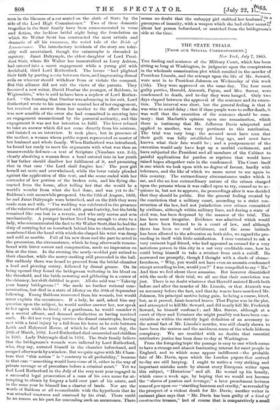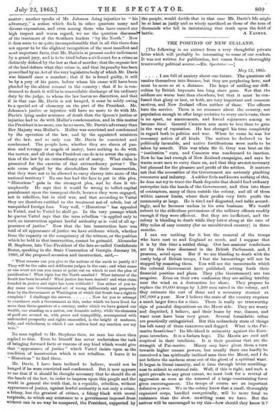THE STATE TRIALS.
[FROM OUR SPECIAL CORRESPONDENT.] /Vett) York, July 7, 1865. '1'lle finding and sentence of the Military Court, which has been sitting so long at Washington, in judgment upon the conspirators in the wholesale assassination plot which resulted in the murder of President Lincoln, and the attempt upon the life of Mr. Seward, were sent in to President Johnson on Wednesday of this week (5th). They were approved on the same day. The four most guilty parties, Herrold, Atzeroth, Payne, and Mrs. Surrat, were condemned to death, and to-day they were hanged. Only two days elapsed between the approval of the sentence and its execu- tion. The interval was short, but the general feeling is that it was wise to avoid delay ; that if these people were to suffer death, it was well that the execution of the sentence should be sum- mary; that Macbeth's opinion upon one assassination, which there is testimony that Mr. Jefferson Davis misquoted and applied to another, was very pertinent to this retribution. The trial was very long ; the accused must have seen that their guilt was fully established long ago, and must have known what their fate would be ; and a postponement of the execution would only have kept up a morbid excitement, and have subjected the President and all members of the Cabinet to painful applications for pardon or reprieve that would have raised hopes altogether vain in the condemned. The Court itself is one which we look upon with no degree of favour, hardly with tolerance, and the like of which we mean never to see again in this country. The extraordinary circumstances under which it sat, and the no loss extraordinary nature of the crimes charged upon the persons whom it was called upon to try, caused us to ac- quiesce in, but not to approve, its proceedings after it was decided that they should be public. But the general feeling created by the conviction that a military court, according to a strict con-. struction of the law, had not jurisdiction over crimes committed by civilians, although within military lines, and during a state of civil war, has been deepened by the manner of the trial. This has been most irregular. Evidence was admitted which would not have been listened to in a court of law, and although there has been no real unfairness, and the same latitude has been allowed to the advocates on both sides, we regard the pro- ceeding in itself with little satisfaction. I once ventured to ask a very eminent legal friend, who had appeared as counsel far a very notorious person in this city in a not very creditable case, how he could bring himself to take a retainer from such a caitiff. He answered me promptly, though I thought with a shade of shame- facedness, " Why, you would not have even an assassin condemned except according to law, would you ?" I was compelled to say " No." And thus we feel about these assassins. But however dissatisfied with the mode of their trial, we all see that their conviction was just. There is no doubt whatever that Herrold assisted Booth both before and after the murder of Mr. Lincoln, or that Atzeroth was an accessory before the fact, and that he was to have murdered Mr. Johnson, his principal motive being gain, he being a coarse, hired, but, as it proved, faint-hearted bravo. That Payne was in the plot, and attempted to kill Mr. Seward, and did nearly kill Mr. Frederick Seward, he himself confessed ; and Mrs. Surrat, although at a court of Oyer and Terminer she might possibly not have been con- victable as within the strictly legal definition of an accessory to the actual fact of Mr. Lincoln's murder, was still clearly shown to have been the matron and the assiduous nurse of the whole hideous conspiracy. We are troubled with no doubts that essential retributive justice has been done to-day at Washington.
From the foregoing topic the passage is easy to one which seems to have a strange and almost fascinating interest for most people in England, and to which none appear indifferent—the probable fate of Mr. Davis, upon which the London papers that arrived to-day are still harping. I ought to notice a very striking and important mistake made by almost every European writer upon this subject, " Historicus " and all. He wound up his homily, which came a week ago, by hoping that we would not become the "slaves of passion and revenge;" a later preachment lectures someof you upon our "startling baseness and cruelty," as revealed by the prospect of a violent death for Mr. Davis; another writer in eminent place says that " Mr. Davis has been guilty of a kind of constructive treason," but of course that is comparatively a smaU
matter ; another speaks of Mr. Johnson doing injustice to " his adversary," a notion which finds in other quarters many and diverse expressions, and even among those who have earned our high respect and warm regard, we see the question disc
of the treatment of the Southern leaders "by the North." Now it does seem to us quite incomprehensible that in all this there does not appear to be the slightest recognition of the most manifest and most important facts, that Mr. Davis is at present under indictment by a grand jury, and is to be tried before a civil court for a crime as distinctly defined by the law as that of murder; that the organic law of the land defines what that crime is, and that its penalty has been prescribed by an Act of the very legislative body of which Mr. Davis was himself once a member ; that if he is found guilty, it will be by a jury of his peers, before whom his cause will have been pleaded by the ablest counsel in the country ; that if he is con- demned to death it will be in unavoidable discharge of his ordinary duty by the judge, to whom the law leaves no discretion, and that if in that case Mr. Davis is not hanged, it must be solely owing to a special act of clemency on the part of the President. Mr. Johnson's justice or injustice will have no more to do with Mr. Davis's lying under sentence of death than the Queen's justice or injustice had to do with Mtiller's condemnation, and in this matter the President is no more, can be no more, Mr. Davis's adversary than Her Majesty was Mtiller's. Midler was convicted and condemned by the operation of the law, and by the appointed ministers of the law, and so only can Mr. Davis be convicted and condemned. The people here, whether they are slaves of pas- sion and revenge or angels of mercy, have nothing to do with the matter, and all that the President can do is to arrest the opera- tion of the law by an extraordinary act of mercy. What claim is presented for the exercise of that extraordinary power ? The sole cause alleged by the slaveholders for their insurrection, that they were not to be allowed to carry slavery into more of the national territory? No one has had the face to put in this plea. " Historicus " puts in the strongest plea, acid he does it tri- umphantly. He says that it would be wrong to inflict capital punishment upon the insurgent chiefs, because they were engaged, not in rebellion, but in civil war, and that according to Vattel they are therefore entitled to the treatment not of rebels, but of vanquished foreign foes. Very well, " Historicus " has appealed to Vattel, and to Vattel he shall go. In the very passage which he quotes Vattel says that the term rebellion " is applied only to such an insurrection against lawful authority as is void of all ap- pearance of justice." Now that the late insurrection here was void of all appearance of justice we have evidence which, whether from the capacity or the competency of the witness, or the position which he held in that insurrection, cannot be gainsaid. Alexander H. Stephens, late Vice-President of the late so-called Confederate States, speaking in the State Convention of Georgia, January 18, 1860, of the proposed secession and insurrection, said,— "What reasons can you give to the nations of the earth to justify it? They will be the calm and deliberate judges in the case ; and what cause or one overt act can you name or point out on which to rest the plea of justification ? What right has the North assailed ? What interest of the South has been invaded ? What justice has been denied? and what claim founded in justice and right has been withheld ? Can either of you to- day name one Governmental act of wrong deliberately and purposely done by the Government at Washington of which the South has a right to complain ? I challenge the answer Now for you to attempt to overthrow such a Government as this, under which we have lived for more than three-quarters of a century, under which we have gained our wealth, ors• standing as a nation, our domestic safety, while the elements of peril are around us, with peace and tranquillity, accompanied with unbounded prosperity and rights unassailed, is the height of madness, folly, and wickedness, to which I can neither lend my sanction nor my vote."
No man replied to Mr. Stephens then, no man has since then replied to him. Even he himself has never undertaken the task of bringing forward facts or reasons of any kind which would give that "appearance of justice" which Vattel insists upon as the condition of insurrection which is not rebellion. I leave it to " Ilistoricus " to find them.
Mr. Davis, I have been inclined to believe, would not be hanged if he were convicted and condemned. But it now appears to me that if it should be thought necessary that he should die at the hands of the law, in order to impress upon this people and the world in general the truth that, in a republic, rebellion, without appearance of justice, against lawful authority is not only a crime, a felony, but the greatest of crimes, a felogy black with moral turpitude, to which any resistance to a goverament imposed frem without can in no way be compared, the President, supported by
I .:,•11
the people, would decide that in that ease Mr. Davis's life might be at least as justly and as wisely sacrificed as those of the tens of thousands who fell in maintaining that truth upon the field of































 Previous page
Previous page